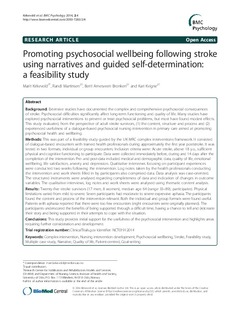Promoting psychosocial wellbeing following stroke using narratives and guided self-determination: a feasability study
Journal article, Peer reviewed
Permanent lenke
http://hdl.handle.net/11250/193534Utgivelsesdato
2014Metadata
Vis full innførselSamlinger
Originalversjon
Kirkevold, M., Martinsen, R., Bronken, B.A. & Kvigne, K. (2014). Promoting psychosocial wellbeing following stroke using narratives and guided self-determination: a feasability study. BMC Psychology, 2:4. doi: 10.1186/2050-7283-2-4 10.1186/2050-7283-2-4Sammendrag
Background: Extensive studies have documented the complex and comprehensive psychosocial consequences
of stroke. Psychosocial difficulties significantly affect long-term functioning and quality of life. Many studies have
explored psychosocial interventions to prevent or treat psychosocial problems, but most have found modest effects.
This study evaluated, from the perspective of adult stroke survivors, (1) the content, structure and process and (2)
experienced usefulness of a dialogue-based psychosocial nursing intervention in primary care aimed at promoting
psychosocial health and wellbeing.
Methods: This was part of a feasibility study guided by the UK MRC complex interventions framework. It consisted
of dialogue-based encounters with trained health professionals during approximately the first year poststroke. It was
tested in two formats; individual or group encounters. Inclusion criteria were: Acute stroke, above 18 y.o., sufficient
physical and cognitive functioning to participate. Data were collected immediately before, during and 14 days after the
completion of the intervention. Pre- and post-data included medical and demographic data, quality of life, emotional
wellbeing, life satisfaction, anxiety and depression. Qualitative interviews focusing on participant experiences
were conducted two weeks following the intervention. Log notes taken by the health professionals conducting
the intervention and work sheets filled in by participants also comprised data. Data analysis was case-oriented.
The structured instruments were analysed regarding completeness of data and indication of changes in outcome
variables. The qualitative interviews, log notes and work sheets were analysed using thematic content analysis.
Results: Twenty-five stroke survivors (17 men, 8 women), median age 64 (range 33–89), participated. Physical
limitations varied from mild to severe. Seven participants had moderate to severe expressive aphasia. The participants
found the content and process of the intervention relevant. Both the individual and group formats were found useful.
Patients with aphasia reported that there were too few encounters (eight encounters were originally planned). The
participants underscored the benefits of being supported through a difficult time, having a chance to tell and (re)create
their story and being supported in their attempts to cope with the situation.
Conclusions: This study provides initial support for the usefulness of the psychosocial intervention and highlights areas
requiring further consideration and development.
Beskrivelse
Vitenskapelig, fagfellevurdert artikkel
